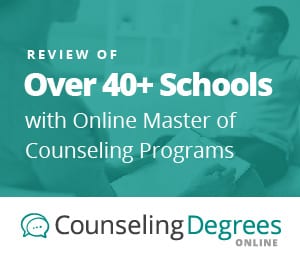 Walden University : MS in School Counseling (CACREP Accredited, five specializations to choose from)
Walden University : MS in School Counseling (CACREP Accredited, five specializations to choose from) Walden University : MS in Clinical Mental Health Counseling (CACREP Accredited, six specializations to choose from)
Walden University : MS in Clinical Mental Health Counseling (CACREP Accredited, six specializations to choose from) Grand Canyon University : Master's Degree in Counseling (Affordable Program with No Out of State Tuition)
Grand Canyon University : Master's Degree in Counseling (Affordable Program with No Out of State Tuition) Capella University : Bachelor of Science in Psychology (Capella University is HLC accredited)
Capella University : Bachelor of Science in Psychology (Capella University is HLC accredited) Capella University : BS in Psychology - Applied Behavior Analysis ((Online))
Capella University : BS in Psychology - Applied Behavior Analysis ((Online)) Liberty University : MA: Clinical Mental Health Counseling (CACREP Accredited) (Online with required intensives)
Liberty University : MA: Clinical Mental Health Counseling (CACREP Accredited) (Online with required intensives) Northwestern University : Online MA in Counseling (CACREP Accredited)
Northwestern University : Online MA in Counseling (CACREP Accredited) Capella University : Counseling & Therapy (CACREP Accreditation. Master's and PhD options available. )
Capella University : Counseling & Therapy (CACREP Accreditation. Master's and PhD options available. ) Pepperdine University : Master’s Clinical Psychology (Licensed Professional Counselor) (No GRE required)
Pepperdine University : Master’s Clinical Psychology (Licensed Professional Counselor) (No GRE required)Common Paths for a Counseling Career
A few of the most common types of counselor jobs are listed below.
School Counselor
School counselors work in academic settings (typically a high school), where they help students handle both academic and social challenges as well as make plans for after graduation. According to the U.S. Bureau of Labor Statistics (BLS), the annual median salary for school and career counselors was $58,120 in 2020. Those interested in this field should seek a degree program focused on school counseling.
Child/Pediatric Counselors
Child/pediatric counselors, sometimes called adolescent counselors, work with children and teens to assess, diagnose, and treat mental impairments or social disruptions that can interfere with a child’s wellness. The BLS reports the general job category of substance abuse, behavioral disorder, and mental health counselors made a median annual salary of $47,660 in 2020, but this can fluctuate based on level of education and practice location. To be a counselor in this specialty, individuals should have a master’s degree or higher. Doctorate degrees are required for private practice counselors.
Mental Health Counselor
Mental health counselors work with individuals suffering from various mental impairments, including depression, anxiety, or trauma. They assess patient conditions, design and implement treatment plans, and observe treatment effectiveness. BLS data for substance abuse, behavioral disorder, and mental health counselors shows a median annual salary of $47,660 in 2020. Pursuing this counseling career requires a mental health counseling degree.
Substance Abuse Counselor
Working in hospitals, rehabilitation centers, and private practices, these counselors help individuals manage their recovery from drug or alcohol addiction. The BLS reports that substance abuse, behavioral disorder, and mental health counselors made a median annual salary of $47,660 in 2020. To seek work in this field, a substance abuse counseling degree is recommended.
Career Counselor
Career counselors assist their clients in assessing their skills to determine their best career path. They typically work in schools or counseling offices. According to the BLS, school and career counselors made an annual median salary of $58,120 in 2020. A bachelor’s degree in counseling is a good way to enter this field.
Family Counselor
Family counselors typically work to help families with conflict resolution and to address complicated dynamics that may come from blended families, past trauma, and more. Most of the time, these counselors work in private practice. BLS data for marriage and family therapists reports a 2020 annual median salary of $51,340. Those who wish to pursue a family counseling path should consider family and marriage counseling degree programs.
Marriage Counselor
Marriage counselors work with married couples either individually or together to determine marital strengths and weaknesses in hopes of strengthening relationships. Like family counselors, they also help with conflict resolution. The BLS reports an annual median salary of $51,340 for marriage and family therapists in 2020. Those who wish to pursue a marriage counseling path might consider family and marriage counseling degree options.
Rehabilitation Counselors
Counselors who work in rehabilitation centers typically provide individual and group therapy to help clients who struggle from emotional, social, or psychological disorders. The goal is typically to empower these clients to live independently, and to cope with the effects of their disability in a constructive way. According to the BLS, the annual median salary for rehabilitation counselors in 2020 was $37,530. A master’s in rehabilitation counseling can help prepare for success in this role.
Geriatric Counselor
Geriatric counselors assist individuals and families suffering from the effects of aging, including effects of dementia. Geriatric counselors fall under the BLS category of substance abuse, behavioral disorder, and mental health counselors, who made a reported median annual salary of $47,660 in 2020. To enter this field, a geriatric counseling degree program is recommended.
Guidance Counselor
Guidance counselors are closely related to school counselors and typically work in an academic setting. Their role is less focused on navigating social concerns, and is instead centered on helping students make decisions about their continuing education or vocational choices. The BLS reports an annual median salary of $62,320 for the role. Guidance counseling degree programs can provide a foundation for success in this counseling career.
Religious/Spiritual Counselor
Spiritual counselors work with individuals from various walks of life to find empowerment and conquer everyday struggles through spirituality. They are most often found in private practice, schools, or churches. The BLS entry for clergy reports an annual median salary of $56,560 in 2020. A good way to pursue this vocation is by looking into different spiritual counseling programs.
Grief Counselor
The role of a grief counselor is to work with individuals and families who have experienced traumatic events or the loss of a loved one. They fall under the BLS job category of substance abuse, behavioral disorder, and mental health counselors, who made a reported median annual salary of $47,660 in 2020. To enter this field, it is best to pursue a grief counseling degree program.
FAQ: How much do counselor's make? Find our in our Counselor Salary Guide.
Consider a Featured Online Counseling Program
| School and Program Information | Online Program? Entry Requirements |
Course Information |
|---|---|---|
| Walden University
MS in School Counseling
 CACREP Accredited CACREP Accredited |
✔ Online
GRE scores not required |
School counselors help students overcome obstacles and shape successful futures. Walden’s online MS in School Counseling program will give you a solid foundation in school counseling theories, approaches, and best practices while enabling you to gain hands-on experience. Learn More |
| Walden University
MS in Clinical Mental Health Counseling
 CACREP Accredited CACREP Accredited |
✔ Online
GRE scores not required |
Mental health counselors play a valuable role in helping people cope with life’s challenges. Walden’s online MS in Clinical Mental Health Counseling program can help you become the competent, compassionate counselor you know you can be. Learn More |
| Grand Canyon University
Master's Degree in Counseling
HLC and NASAC Accredited |
✔ 100% Online
Over 14 Specializations Available |
Affordable with No Out of State Tuition Learn More |
| Capella University
Bachelor of Science in Psychology
|
✔ Online
|
Choose from General Psychology, Applied Behavior Analysis or Pre-Counseling specializations Learn More |
| Capella University
BS in Psychology - Applied Behavior Analysis
|
✔ Online
No GMAT or GRE required |
Gain skills and knowledge to help transform the lives of people living with autism and other intellectual disabilities. Study with confidence in a program that meets the educational requirements for eligibility to take the Board Certified Assistant Behavior Analyst® (BCaBA) examination. Applicants must meet additional requirements to qualify. Learn More |
| Liberty University
MA: Clinical Mental Health Counseling (CACREP Accredited)
 CACREP Accredited CACREP Accredited |
✔ Online
Online with required intensives |
Our CACREP-accredited master’s in counseling degree online can help you become an ethical, well-trained mental health counselor with the knowledge, values, and skills you need to empower others to make positive changes in their lives. Online and on campus. Training Champions for Christ since 1971. Learn More |
| Northwestern University
Online MA in Counseling
 CACREP Accredited CACREP Accredited |
✔ Online
GRE Not Required Bachelor's Required |
Prepare to pursue licensure in as few as 18 months Learn MoreFull-time, part-time, and accelerated track options available |
| Capella University
Counseling & Therapy
 CACREP Accredited CACREP Accredited |
✔ Online
GRE Not Required |
Offering master’s degree programs in clinical mental health counseling and school counseling. Doctoral degree program available in counselor education & supervision. No GRE required. Learn More |
| Pepperdine University
Master’s Clinical Psychology (Licensed Professional Counselor)
|
✔ Online
No GRE Required Bachelor's Degree Required |
Bachelor's holders can prepare to become a licensed professional counselor online. With no GRE scores required to apply, the 24 month online MA in Clinical Psychology from Pepperdine allows you to advance your career and be a catalyst of change. Learn More |
*Sponsored Counseling Programs
Online CACREP Accredited programs | Online MPCAC Accredited programs
Careers in Counseling: Where Will You Work?
Another way to distinguish between careers in counseling is to explore their different types of work environments. Check out some of the common areas where counselors work.
Educational Requirements for a Career in Counseling
First of all, a degree in counseling is required to become licensed and begin working in the field. Keep the following points in mind.
Coursework for Different Types of Counseling Careers
Once you are enrolled in a master’s in counseling degree program, you can expect to take courses that are related to assessing and treating various mental health conditions, providing support through common life circumstances, and identifying issues that may cause emotional harm. The coursework must meet the standard of the accreditation agency to be considered a reliable resource for your educational goals. Here are some common courses required for all different types of counseling careers
 Walden University - MS in School Counseling (CACREP Accredited)
Walden University - MS in School Counseling (CACREP Accredited)
 Walden University - MS in Clinical Mental Health Counseling (CACREP Accredited)
Walden University - MS in Clinical Mental Health Counseling (CACREP Accredited)
 Grand Canyon University - Master's Degree in Counseling (NASAC Accredited)
Grand Canyon University - Master's Degree in Counseling (NASAC Accredited)
 Capella University - Bachelor of Science in Psychology (Capella University is HLC Accredited)
Capella University - Bachelor of Science in Psychology (Capella University is HLC Accredited)
 Capella University - BS in Psychology - Applied Behavior Analysis (Capella University is HLC Accredited)
Capella University - BS in Psychology - Applied Behavior Analysis (Capella University is HLC Accredited)
 Liberty University - MA: Clinical Mental Health Counseling (CACREP Accredited) (CACREP Accredited)
Liberty University - MA: Clinical Mental Health Counseling (CACREP Accredited) (CACREP Accredited)
 Northwestern University - Online MA in Counseling (CACREP Accredited)
Northwestern University - Online MA in Counseling (CACREP Accredited)
 Capella University - Counseling & Therapy (CACREP Accredited)
Capella University - Counseling & Therapy (CACREP Accredited)
Counseling Careers
Licensing Requirements for Different Types of Counseling Jobs
One of the most important steps in becoming a counselor is planning for licensure. Although this is the final step toward a career in the field, you should start considering the requirements of licensing before even choosing a degree program. Here are the basic steps to obtain licensing for most types of counseling jobs.
Obtain a Master’s Degree in Counseling
Searching for an accredited degree program should be your first step, so you can ensure it will be accepted during the licensure process. Individuals who are interested in becoming licensed counselors should be prepared to earn a master’s degree in counseling at a minimum. There are many different broad and specialty degree programs in counseling available, so you should research the requirements of each degree program prior to entry.
Earn Supervised Clinical Hours
In addition to an accredited degree program, you should also consider how and where you can engage in supervised practice during and after your degree program. Some colleges offer referral programs for enrolled students, while others lay the burden on you to arrange your own student-work situation. Before starting a degree program, you should take a look at what each school offers in terms of the practicum requirement. If your chosen university does not offer help in setting up the practicum, you can speak with counseling organizations within your area to secure a placement.
Practicum requirements vary by state, but in general you can expect to work at least 1,000 supervised hours. During this experience, you will work with actual clients under the direct supervision of a licensed counselor. This often begins with shadowing and learning from experienced counselors, then leads to providing independent counseling services to the clients within your facility. This component ties together program curricula and their application in a real-world setting.
Pass the State Board Licensing Exam
Lastly, most states require that applicants complete a state examination in counseling prior to being approved for licensure. This examination is called the National Counselor Examination for Licensure and Certification (NCE). It consists of terms and scenarios that can occur while working in the field and tests knowledge of counseling skills and ethics. Once you have successfully completed this test, you can move forward with obtaining your license to practice counseling within your state.
Most states also require that graduates document 1-2 years of supervised work experience under the supervision of a licensed counselor. This experience requirement allows you to take part in standard counseling activities while being supervised by an experienced counselor.
Your work is documented and sent to the state. The hours you worked are then credited to the experience requirement of becoming a licensed counselor. Depending on the state, registration is required, along with the submission of quarterly reports signed by your supervising counselor.
Program Areas for Various Types of Counseling Careers
When planning a career in counseling, it may be helpful to consider the concentrations that different programs offer.
Individual, Family, and Marriage Counseling
Counseling programs that focus on individuals and families may be a great option for students interested in promoting healthy relationships. These programs teach students techniques that are specific to the needs of families and individuals, such as assessing a family unit to discover areas of conflict, and establishing treatment plans.
School Counseling and Guidance Counseling
Focusing on education and occupational goals, these areas of counseling can be found in degree programs all over the U.S. Students learn how to promote educational and career goals in children and young adults in schools and beyond. Degree programs offering these specialties can help students learn more about resources and analytical tools that can help match students with services they need.
Substance Abuse and Rehabilitation Counseling
Addiction is a continuing epidemic. Counselors who pursue degree programs in this area learn how addiction affects individuals, families, and communities. Students learn how to assess clients and provide treatment that helps them develop coping mechanisms for past traumas and life challenges.
Mental Health Counseling
One of the most popular degree programs for future counselors may be mental health counseling. This program area introduces students to common mental health disorders such as depression, anxiety, and bipolar disorder. By learning more about these disorders, students gain a better understanding of how they can be treated in a clinical setting.
Types of Counselor Jobs in a School Setting
Counseling jobs can be found in early childhood education, elementary education, and high school education settings. All offer opportunities to become positive role models and leaders in the school system.
Early Childhood Education Counseling
If you are interested in helping the health and mental well-being of newborns to six-year-olds, you may want to earn a certification in early childhood mental health counseling. Many programs require a practicum or internship, where you work in an early childhood setting. When you are comparing programs, ask about opportunities for first-hand experience in the field as you complete your education. Also, ask what institutions have hired their graduates.
A master’s degree in school counseling may be your best path to this career goal.
Elementary Education Counseling Education and Careers
When pursuing an elementary education counseling career path, you should consider courses that increase your knowledge, develop your proficiency, and broaden your thinking. Counselors in today’s school systems at every grade level must have a keen understanding of students who come from all cultures and economic backgrounds. Students from all walks of life face increasingly complex challenges, even at the elementary level. You may also take courses that emphasize group counseling techniques, as you may need to counsel students and their peers, teachers, and families.
Elementary education counselors must learn how to advocate for children, while working toward achieving successful, healthy outcomes. To prepare, take bachelor’s- and graduate-level psychology courses that focus on adolescent and childhood psychology. Understanding the mindset of the age group you work with can be a crucial piece of the elementary counseling professional puzzle.
Take the First Step Toward a Counseling Career
Still curious about pursuing a counseling career? Here are some of the most popular online counseling programs. On each page you will find a detailed write-up of the program, specific courses, and schools that are currently accepting applicants to the program.
- Online Counseling Degrees
- Online Master’s in Counseling
- Bachelor’s in Counseling
- Master’s in Counseling
- Counseling Schools by State
- Counseling Career Guide
- Highest Paid Counseling Jobs
Sources:
United States Bureau of Labor Statistics, Clergy
United States Bureau of Labor Statistics, Educational, Guidance, and Career Counselors and Advisors
United States Bureau of Labor Statistics, Marriage and Family Therapists
United States Bureau of Labor Statistics, Rehabilitation Counselors
United States Bureau of Labor Statistics, School and Career Counselors and Advisors
United States Bureau of Labor Statistics, Substance Abuse, Behavioral Disorder, and Mental Health Counselors

 Pepperdine University - Master’s Clinical Psychology (Licensed Professional Counselor)
Pepperdine University - Master’s Clinical Psychology (Licensed Professional Counselor)








